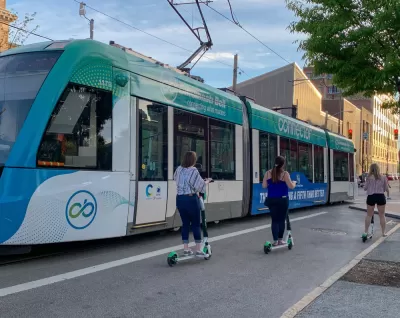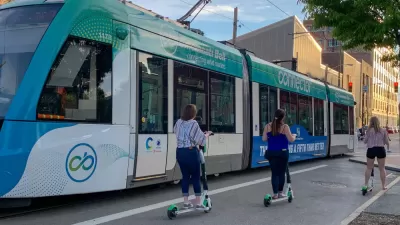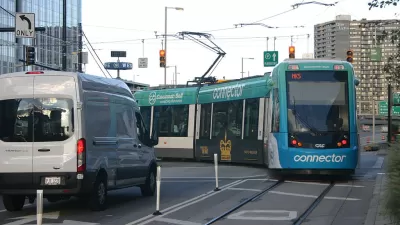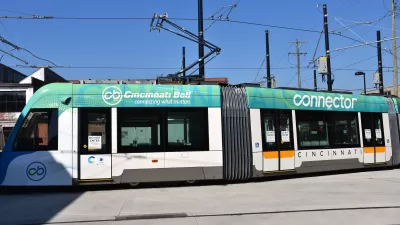The Cincinnati Bell Connector has been offering free rides since reopening in October, but the Cincinnati City Council recently decided to make the free rides a permanent feature.

"Since reopening after a pandemic-related suspension, Cincinnati's streetcar has not charged fares for passengers to ride. Starting [November 1], that change will become permanent," reports Pat LaFleur.
The free ride rely on a fare-free operations structure first implemented as a 60-day measure in September, according to LaFleur. In addition to the benefits of free rides, streetcar riders are also expected to benefit from improved service performance, as the time for paying fare has been removed from the boarding equation.
"Given the pandemic-related, months-long streetcar shutdown, and now having operated fare-free for the last two months, recent data regarding how much fare revenue the streetcar collected on a daily basis is scarce and unreliable," writes LaFleur. "In a May 2019 memo, then-City Manager Patrick Duhaney estimated that the Connector had brought in roughly $330,000 in fares in 2018, but the cost to collect those fares -- including printing the tickets, maintaining the ticket vending machines and paying fare inspectors -- offset that revenue by nearly $260,000."
The article also includes details of Mayor John Cranley's counter proposal, which failed to gain the political traction over the fare-free idea.
FULL STORY: Cincinnati streetcar will go fare-free permanently starting Nov. 1

Alabama: Trump Terminates Settlements for Black Communities Harmed By Raw Sewage
Trump deemed the landmark civil rights agreement “illegal DEI and environmental justice policy.”

Study: Maui’s Plan to Convert Vacation Rentals to Long-Term Housing Could Cause Nearly $1 Billion Economic Loss
The plan would reduce visitor accommodation by 25% resulting in 1,900 jobs lost.

Planetizen Federal Action Tracker
A weekly monitor of how Trump’s orders and actions are impacting planners and planning in America.

Waymo Gets Permission to Map SF’s Market Street
If allowed to operate on the traffic-restricted street, Waymo’s autonomous taxis would have a leg up over ride-hailing competitors — and counter the city’s efforts to grow bike and pedestrian on the thoroughfare.

Parklet Symposium Highlights the Success of Shared Spaces
Parklets got a boost during the Covid-19 pandemic, when the concept was translated to outdoor dining programs that offered restaurants a lifeline during the shutdown.

Federal Homelessness Agency Places Entire Staff on Leave
The U.S. Interagency Council on Homelessness is the only federal agency dedicated to preventing and ending homelessness.
Urban Design for Planners 1: Software Tools
This six-course series explores essential urban design concepts using open source software and equips planners with the tools they need to participate fully in the urban design process.
Planning for Universal Design
Learn the tools for implementing Universal Design in planning regulations.
Caltrans
Smith Gee Studio
Institute for Housing and Urban Development Studies (IHS)
City of Grandview
Harvard GSD Executive Education
Toledo-Lucas County Plan Commissions
Salt Lake City
NYU Wagner Graduate School of Public Service





























